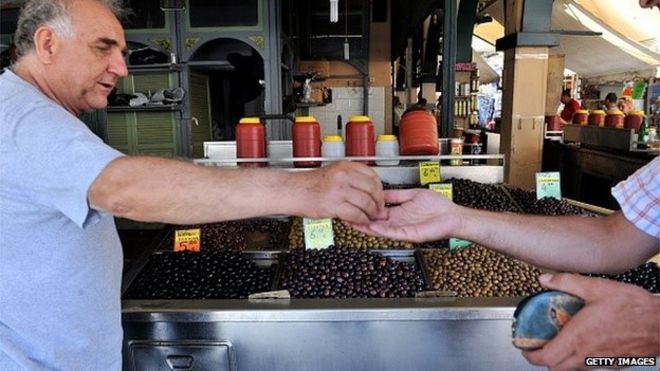
The outlook for the eurozone has improved, says the International Monetary Fund (IMF), thanks to a falling oil price, a weaker euro and action taken by the European Central Bank (ECB).
It predicted that growth would pick up to 1.7% next year, from 1.5% this year.
However, the IMF warned that the region was still "vulnerable to shocks".
This could tip the block into "prolonged stagnation," the fund said in its latest assessment of the region.
It cited uncertainty arising from the situation in Greece as a potential trigger for such a shock, saying that further volatility from the situation could not be ruled out.
Greece is currently negotiating its third bailout with creditors.
ECB plan
"Several factors cloud the outlook for growth over the next five years," said the IMF's Mahmood Pradhan.
"These include high unemployment, especially among the youth; large corporate debt; and rising non-performing loans in the banking system.
"A moderate shock to confidence - whether from lower expected future growth or heightened geopolitical tensions - could tip the block into prolonged stagnation," he said,
Inflation would remain near zero in 2015 and rise to 1.1% in 2016, the IMF predicted.
Earlier this year, the ECB launched a €60bn-a-month asset-buying programme in an attempt to stimulate the economy and avoid deflation.
The IMF praised the plan, saying it had boosted confidence and improved financial conditions, and suggested that it should remain in place until September 2016, if not longer.

Analysis: Andrew Walker, BBC economics correspondent
The message from the IMF is that the eurozone has more work to do. And it is not just the obvious calls for reform of the structure of the eurozone and for further work from the countries that have struggled.
There is a call for Germany to do more - not screaming out from the headlines of the report it must be said, but it is there.
The IMF refers to countries with what it calls excessive current account surpluses - which means international trade in goods and services and some financial flows.
It says they should invest more in infrastructure and, less directly, it suggests that they should boost demand. The report names Germany and the Netherlands as countries where these surpluses are continuing to grow.
These imbalances have a wider significance for the eurozone. Having such a surplus means the countries concerned have the capacity to import more from, among others, their eurozone neighbours, who could use any extra help they can get.
No comments:
Post a Comment